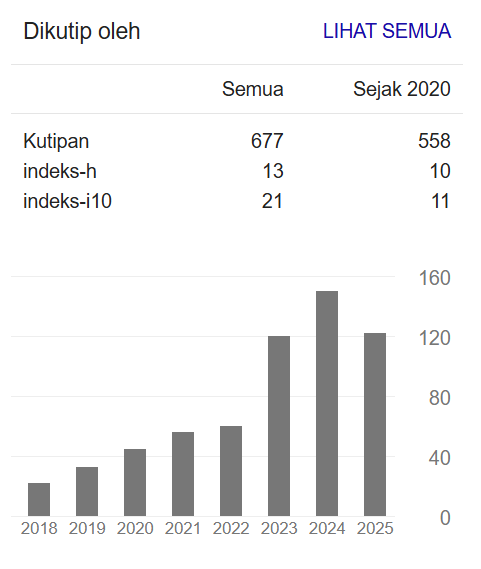THE ONTOLOGICAL CAPTURE OF REASON AND REVELATION
TOWARD A SYNTHESIZING APPROACH OF IBN ‘ARABĪ AND MULLĀ ṢADRĀ
DOI:
https://doi.org/10.20871/kpjipm.v9i2.272Keywords:
Creative Imagination, Gradation of Being, Ibn ‘Arabī, Mullā Ṣadrā, Ontological ApproachAbstract
Reason and revelation are a topic that is debated by many parties to determine the position and superiority between reason and revelation. There are differences of opinion among thinkers regarding the position of reason and revelation. This debate has also attracted the attention of many Islamic thinkers, including Islamic philosophers. This paper explores the ontological capture of reason and revelation debate by two of the most prominent Sufi philosophers, Ibn ‘Arabī and Mullā Ṣadrā. This research employs a literature review as a research methodology, with an emphasis on synthesis and integration. Through this research, it can be concluded that Ibn ‘Arabī’s and Mullā Ṣadrā’s ontological perspectives have deconstructed theological and epistemological disagreements between rationalists who place reason above revelation and their traditionalist opponents. Ibn ‘Arabī’s theory of creative imagination unveils the ontological order of reason and revelation, whereas Mullā Ṣadrā’s theories of tashkīk (gradation of being) and the union of the knower and the known during the production of knowledge (or to be more precise, the union of intellect and intelligible during intellection) consistently place reason and revelation not in opposing sides but rather in a single gradational existence. Both Ibn ‘Arabī and Mullā Ṣadrā have broken the theological and epistemological vicious cycle by introducing ontological interventions into the debate. Ibn ‘Arabī and Mullā Ṣadrā may or may not have intended to participate in the polemic; as a result, these outcomes were rarely mentioned in the historical context of the ideas.
Downloads
References
Akkach, Samer. 1997. “The World of Imagination in Ibn ‘Arabi’s Ontology.” British Journal of Middle Eastern Studies 24 (1): 97–113. https://doi.org/10.1080/13530199708705640.
Amini, Majid. 2006. “Revelation in the Reflections of Reason.” New Blackfriars 87 (1010): 406–17. https://doi.org/10.1111/j.0028-4289.2006.00157.x.
Arabi, Ibn. n.d. Al-Futūḥāt al-Makkiyah. Vol. 1. Dār al-Kutub al-‘Arabiyyah al-Kubrā.
———. n.d. Al-Futūḥāt al-Makkiyah. Vol. 2. Dār al-Kutub al-‘Arabiyyah al-Kubrā.
———. n.d. Al-Futūḥāt al-Makkiyah. Vol. 3. Dār al-Kutub al-‘Arabiyyah al-Kubrā.
Bagir, Haidar. 2017. Epistemologi Tasawuf. Bandung: Mizan.
Chittick, William C. 2013. Science of the Cosmos, Science of the Soul. Oneworld Publications.
Corbin, Henry. 1981. Creative Imagination in the Sufism of Ibn ’Arabi. Princeton.
———. 1994. The Man of Light in Iranian Sufism. Omega Publications.
El-Tobgui, Carl Sharif. 2020. Ibn Taymiyyah on Reason and Revelation: A Study of Dar’ Ta‘āruḍ faAl-‘Aql Wa-l-Naql. Leiden Boston: Brill.
Fakhry, Majid. 1965. “Al-Farabi and the Reconciliation of Plato and Aristotle.” Journal of the History of Ideas 26 (4): 469–78. https://doi.org/10.2307/2708494.
———. 2004. A History of Islamic Philosophy. New York: Columbia University Press.
Faruque, Muhammad Umar. 2018. The Labyrinth of Subjectivity: Constructions of the Self from Mullā Ṣadrā to Muḥammad Iqbāl. Berkeley: University of California.
Harvey, Ramon. 2021. Transcendent God, Rational World a Maturidi Theology. Edinburgh: Edinburgh University Press.
Izutsu, Toshihiko. 1971. The Concept and Reality of Existence. Keio Institute of Cultural and Linguistic Studies.
———. 1984. Sufism and Taoism: A Comparative Study of Key Philosophical Concepts. Berkeley: University of California Press.
Kazi, Yasir. 2013. Reconciling Reason and Revelation in the Writings of Ibn Taymiyya: An Analytical Study of Ibn Taymiyya’s Darʾ Al-Taʿāruḍ. Yale University.
Leaman, Oliver. 2002. An Introduction to Classical Islamic Philosophy. New York: Cambridge University Press.
Leaman, Oliver, and Seyyed Hossein Nasr, eds. 2001. History of Islamic Philosophy. 1st ed. Canada: Routledge.
Metzger, Barbara J. 1994. “Revelation and Reason: A Dynamic Tension in Islamic Arbitrament.” Journal of Law and Religion 11 (2): 697–714. https://doi.org/10.2307/1051383.
Montada, Josep Puig. 2001. “Reason and Reasoning in Ibn Hazm of Cordova (d. 1064).” Studia Islamica 92 (1): 165–85. https://doi.org/10.2307/1596196.
Murata, Sachiko. 1992. The Tao of Islam: A Sourcebook on Gender Relationships in Islamic Thought. SUNY Press.
Muthahhari. 2009. Al-Kalam. Dār al-Wala.
Nasr, Seyyed Hossein. 2006. Islamic Philosophy from Its Origin to the Present: Philosophy in the Land of Prophecy. State University of New York Press.
Rasic, D. 2021. The Written World of God: The Cosmic Script and the Art of Ibn Arabi. Aqna Publishing.
Renard, John. 2004. Knowledge of God in Classical Sufism: Foundations of Islamic Mystical Theology. New York: Paulist Press.
Ṣadrā, Mullā. 1970. Sharḥ al-Uṣūl al-Kāfī. Maktabah al-Maḥmūdī.
———. 1981a. Al-Ḥikmah al-Muta‘āliyah fī al-Asfār al-‘Aqliyyah al-Arba‘ah. Vol. 8. Dār Iḥyā’ al-Turāth al-‘Arabī.
———. 1981b. Al-Ḥikmah al-Muta‘āliyah fī al-Asfār al-‘Aqliyyah al-Arba‘ah. Vol. 1. Dār Iḥyā’ al-Turāth al-‘Arabī.
———. 1981c. Al-Ḥikmah al-Muta‘āliyah fī al-Asfār al-‘Aqliyyah al-Arba‘ah. Vol. 5. Dār Iḥyā’ al-Turāth al-‘Arabī.
———. 1981d. Al-Ḥikmah al-Muta‘āliyah fī al-Asfār al-‘Aqliyyah al-Arba‘ah. Vol. 3. Dār Iḥyā’ al-Turāth al-‘Arabī.
Snyder, Hannah. 2019. “Literature Review as a Research Methodology: An Overview and Guidelines.” Journal of Business Research 104 (C): 333–39. https://doi.org/10.1016/j.jbusres.2019.07.039.
Ubudiyyat, A. 2010. Al-Niẓām al-Falsafy li Madrasati al-Ḥikmah al-Muta‘āliyah. Vol. 1. Center of Civilization for the Development of Islamic Thought.
Winkel, Eric. 1997. Islam and the Living Law. USA: Oxford University Press.
Yazdi, Mehdi. 1992. The Principles of Epistemology in Islamic Philosophy. New York: State University Of New York Press.
Downloads
Published
How to Cite
Issue
Section
License
Copyright (c) 2023 Musa Alkadzim

This work is licensed under a Creative Commons Attribution 4.0 International License.





























